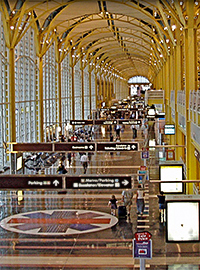| Improve Air Travel by Passing the Bipartisan Direct Capital Access (DCA) Act |
 |
|
By Timothy H. Lee
Thursday, July 13 2023 |
In the ongoing battle against big government and crony capitalism, one current effort appropriately centers on the airport named for the president whom we most associate with the cause: Ronald Reagan. With summer travel season underway, Americans experience anew the needless frustration and inefficiency that characterize air travel throughout the country. Outdated federal regulations bear a significant share of responsibility for that frustration, but two pieces of bipartisan legislation now before Congress offer rare hope for improvement. Specifically, the Direct Capital Access (DCA) Act in the U.S. House, introduced by Representatives Burgess Owens (R – Utah) and Hank Johnson (D – Georgia) with 21 cosponsors, and S. 1933 in the U.S. Senate, introduced by Senators Cynthia Lummis (R – Wyoming) and Raphael Warnock (D – Georgia), would reform antiquated legislation passed in 1966 that artificially restricts nonstop flights into and out of Ronald Reagan Washington National Airport. That artificial perimeter restriction originally aimed to boost the viability of Dulles International Airport, which had just opened in 1962, and today Reagan National is the only airport in America subject to the law’s limitations. In the six decades since then, nationwide air traffic has increased tenfold, and Dulles is a fully thriving international airport with access to the Washington, D.C., Metro mass transit system. Additionally, the northern Virginia area surrounding Dulles has tripled in population since that time, with formerly pastoral surrounding counties like Loudoun and Prince William experiencing particularly high suburban and exurban growth. Accordingly, Dulles no longer needs to be artificially propped up. Meanwhile, Washington, D.C., now suffers the most expensive domestic ticket prices among the nation’s ten largest metropolitan areas, with Dulles claiming the title of most expensive domestic airport from which to depart. A large share of blame for that state of affairs is attributable to the 1966 perimeter rule, which interferes with the free market and limits competition by restricting the number of nonstop flights beyond the 1,250-mile Reagan National radius to just 7 airlines operating 20 daily roundtrips. That’s less than 6% of Reagan National’s daily flight total. Moreover, the existing perimeter restrictions cost the Washington, D.C., region an estimated $290 million annually and 5,500 jobs lost. Then there’s the cost and inconvenience to airline travelers themselves. By the artificial limiting of nonstop flights into the nation’s capital, consumers must spend more time on planes because passengers beyond the 1,250-mile radius (approximately the distance to Omaha, Nebraska or Minneapolis, Minnesota) must make at least one connecting flight, sometimes multiple connections. In addition to that lost time, think of the sheer number of missed connections or stress to consumers worried about missing their connecting flights. Indeed, Reagan National currently suffers 25% more cancelations than airports in metropolitan areas of similar size, precisely because of the higher number of necessary connections. That’s where the DCA Act and S. 1933 come in. Each would add 28 nonstop flights to Reagan Airport inside and beyond the artificial 1,250-mile perimeter. Importantly, the reform laws wouldn’t eliminate any current routes serving regional airports – they would simply add flights in and out of Regan National Airport, not take any away or reorder current capacity. Accordingly, airlines wouldn’t suddenly stop serving smaller markets currently connecting with Reagan National in favor of larger ones. Furthermore, the proposed bills would divide the additional flights among each domestic airline currently operating out of Reagan National, thereby avoiding any accusation of crony capitalism because it wouldn’t benefit any particular airline, but rather treat all existing carriers fairly and equally. As for Reagan National Airport itself, a recent $1 billion expansion project increased terminal capacity, added gates and concourses and boosted security line capacity. As a result, it now possesses the capacity to handle up to 90 additional flights per day. As noted above, the proposals before Congress would add just 28 flights, less than one-third that expanded capacity potential. Accordingly, the bills would utilize existing upgrades at Reagan National Airport, and place it on a more equal footing with other airports across the country. In so doing, the bills would give nationwide air travelers more options, lower ticket prices through greater competition and fewer necessary connections and improve access to the nation’s capital. At the same time, they will benefit the local economy through thousands of new jobs and customers, resulting in hundreds of millions of dollars in economic benefit. Simply put, the existing perimeter restrictions from 1966 no longer serve their original purpose, and now only cause needless inconvenience, frustration and cost to consumers across America. By passing the bipartisan DCA Act and S. 1933, Congress can score an easy win for efficiency and provide some all-too-rare relief to beleaguered air travelers everywhere. |
Related Articles : |
























